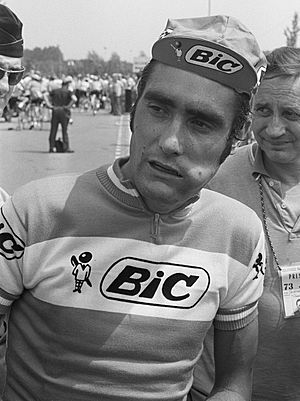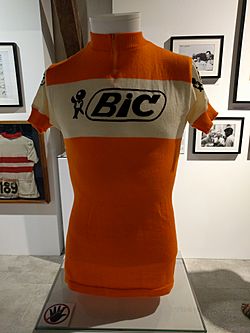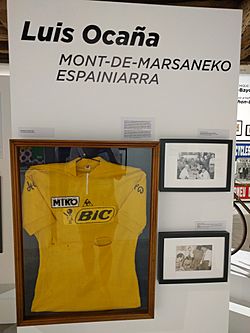Luis Ocaña facts for kids

Ocaña in 1973 Tour de France
|
|||
| Personal information | |||
|---|---|---|---|
| Full name | Jesús Luis Ocaña Pernía | ||
| Born | 9 June 1945 Priego, Cuenca, Spain |
||
| Died | 19 May 1994 (aged 48) Nogaro, Gers, France |
||
| Team information | |||
| Discipline | Road | ||
| Role | Rider | ||
| Rider type | Climber | ||
| Major wins | |||
|
|||
Jesús Luis Ocaña Pernía (born June 9, 1945 – died May 19, 1994) was a famous Spanish road bicycle racer. He is best known for winning the 1973 Tour de France, one of the biggest cycling races in the world. He also won the 1970 Vuelta a España, another major cycling event.
Luis Ocaña was known for his amazing climbing skills. He often challenged other top riders, especially Eddy Merckx, who was a cycling legend. Ocaña's career was full of exciting wins and tough challenges.
Contents
Luis Ocaña's Cycling Journey
Starting Out in Cycling
Luis Ocaña was born in Priego, Cuenca, Spain. When he was 12 years old, his family moved to France in 1957. He started racing with a local club there.
In 1968, Ocaña became a professional cyclist with the Spanish team Fagor. In his first year as a pro, he became the Spanish champion. The next year, he finished second in the Vuelta a España and won the mountains classification. This meant he was the best climber in that race.
In 1970, Ocaña joined the French team Bic. He won his first major race, the 1970 Vuelta a España. He was especially good at time trials, which are races against the clock. A Spanish newspaper even called him "the best time-trialist that Spanish cycling has ever had." In the 1970 Tour de France, he won a stage and finished 31st overall.
The 1971 Tour de France Challenge
Before the 1971 Tour de France, Ocaña showed he was in great form. He finished close behind Eddy Merckx in two important races, Paris–Nice and the Critérium du Dauphiné Libéré.
During the Tour de France, Ocaña made a huge move on stage 11. He rode incredibly well and gained a massive lead of eight minutes over Merckx. This put him in the famous Yellow Jersey, which is worn by the race leader.
However, disaster struck in the Pyrenees mountains. On a downhill section of the Col de Menté, Merckx crashed. Ocaña couldn't avoid him and also fell. While Merckx quickly got back up, Ocaña was hit by another rider and was badly hurt. He had to leave the race by helicopter. His dream of winning the 1971 Tour ended that day. As a sign of respect, Merckx refused to wear the yellow jersey the next day. There is a special memorial at the crash site on the Col de Menté.
In 1972, many people hoped for a big battle between Ocaña and Merckx in the Tour de France. Ocaña had won some important races before the Tour. But he had to leave the race early because he got sick with bronchitis.
In 1973, Merckx decided not to race the Tour de France. This opened the door for other riders. Ocaña raced against Merckx in the 1973 Vuelta a España and finished second.
Winning the 1973 Tour de France
Because Ocaña had faced bad luck in previous Tours, he wasn't seen as the top favorite for the 1973 Tour de France. But he quickly showed his strength. On the third stage, Ocaña and his teammates attacked early and gained a significant lead over their rivals.
He won the first mountain stage and took the yellow jersey. Then, on the third mountain stage, Ocaña rode incredibly well. He left his rivals far behind, gaining many minutes on them. He continued to dominate, winning a time trial stage and another mountain stage.
Luis Ocaña eventually won the 1973 Tour de France by a huge margin of 15 minutes over the second-place rider, Bernard Thévenet. He also won the combativity award for being the most aggressive rider. This was a truly amazing victory for him.
After His Big Win
After winning the Tour de France, Ocaña continued to race. He won a bronze medal at the World Championship road race in 1973. He also won the Tour of the Basque Country again that year.
He retired from professional cycling at the end of 1977. During his career, he won 110 races, including nine stages in the Tour de France. After retiring, he moved to his vineyard. It is said that even though they were rivals on the road, Eddy Merckx helped Ocaña's vineyard by ordering a lot of wine from him.
Luis Ocaña's Legacy
Luis Ocaña passed away in Nogaro, Gers, France in 1994. He is remembered as one of cycling's most exciting and talented riders, especially for his incredible climbing ability and his famous victory in the 1973 Tour de France.
Major Achievements
Luis Ocaña had many important wins during his cycling career:
- Tour de France
- Overall winner in 1973
- Won 9 individual stages
- Vuelta a España
- Overall winner in 1970
- Won the Mountains classification in 1969
- Won 6 individual stages
- Stage Races
- Won the Critérium du Dauphiné Libéré three times (1970, 1972, 1973)
- Won the Tour of the Basque Country twice (1971, 1973)
- One-Day Races
- Won the Spanish National Road Race Championship twice (1968, 1972)
- Won the Grand Prix des Nations in 1971
See also
 In Spanish: Luis Ocaña para niños
In Spanish: Luis Ocaña para niños
 | DeHart Hubbard |
 | Wilma Rudolph |
 | Jesse Owens |
 | Jackie Joyner-Kersee |
 | Major Taylor |



